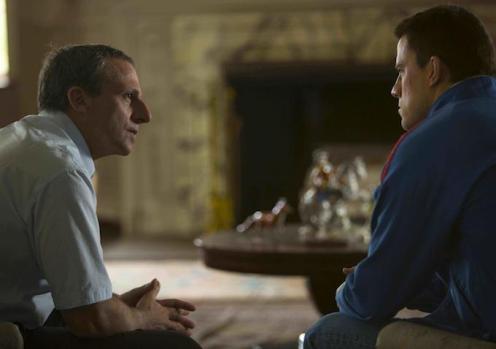4 January 2015
Perhaps an understatement but Foxcatcher is not a film that offers viewers many answers. More than that, Foxcatcher is a film that intentionally withholds information from viewers, making the film both frustrating and intriguing. Viewers are not given any more information than the leading characters know. Quite literally, viewers are non-omniscient flies on the film’s fourth wall, always scrambling to infer, analyze, and keep up and piece together meaning. Although this film demands more of its audience than the average movie, in terms of participation, Foxcatcher is a satisfying film because its indirect technique, particularly its narrative gaps, reveals a clever, effective way to communicate a story full of mental and emotional instability.
Take, for example, one of the film’s leading characters, John du Pont (Steve Carell). The film never directly identifies du Pont as a paranoid schizophrenic (although, in real life, John du Pont was schizophrenic). The film simply captures du Pont’s erratic behaviors and reactions. Such as the scene in which du Pont unexplainably enters his wrestlers’ training room with a loaded gun. Initially, he stands in the room silently, observing his team’s practice. Eventually, after an awkward and unsettling amount of time, he addresses one wrestler and then Team Foxcatcher as a whole, and then he fires the gun into the ceiling, perhaps as his expression of motivation and enthusiasm. Inexplicable and dangerous actions like this one paint a picture of du Pont as mentally unstable, offering the audience ample clues to piece together du Pont’s diagnosis without the film having to state or confirm schizophrenia.
Also mystifying is the film’s other lead character, Mark Schultz (Channing Tatum). Although Mark’s behaviors are not as shocking as du Pont’s, he is an equally anomalous character. Aside from Olympic glory, what is his backstory? Why do his unchecked fits of anger cause him to, literally, beat himself up? Where are his parents and/or friends? Are the root causes to his emotional and social limitations? In Foxcatcher, these questions come to mind, but no direct answers are ever offered.
Without any concrete information on these characters, it is easy to find the slow, drawn-out pace of Foxcatcher trying, even frustrating. Yet, this is exactly how the film provokes its viewers and peaks interest. Not knowing information forces viewers to think, to attempt completing a puzzle with the few pieces the film provides. And, essentially, this is how Foxcatcher captures the story of du Pont’s relationships with the Schultz brothers, by not telling viewers much and not offering explanations, but showing enough for viewers to gain some understanding of the men and the complicated, dysfunctional, and ultimately deadly relationships between them.
The relationship between Mark and du Pont is, initially, the focal point of the film, and it ranges from admiration and comradery to utter shame and disgust. Yet, what really happens between Schultz and du Pont that causes their relations to deteriorate as quickly as it bloomed? The film does not tell viewers the answer, but, after a suspicious night together in du Pont’s gallery, viewers can infer enough to understand why this relationship ends. Late one night, du Pont calls Schultz out of bed for a private wrestling practice in his estate’s art gallery. In the dark, witnessed by only the painted and sculpted artificial eyes, du Pont and Schultz wrestle, passionately. Pinned down by du Pont, a close up on Schultz’s face shows a reaction, a numb but acknowledging reaction to what was likely du Pont molesting Schultz.
The film never addresses sexuality directly, and never confronts the strange physical relationship du Pont has with the Team Foxcatcher athletes, specifically March Schultz, but, without question, something happened between du Pont and Schultz in the gallery scene, highlighted by the close up on Schultz’s face. Post this scene, the relationship between du Pont and Schultz is permanently and irrevocably damaged. Without stating anything or providing direct information, Foxcatcher suggests, by way of omission, so attentive viewers can infer and perhaps understand something about these characters and their relationship.
Moreover, later in the film, after du Pont’s mother passes (Vanessa Redgrave), he retreats to her stables, setting lose all her horses. This scene invites viewers to see the film’s unavoidable conclusion, a foreshadowing of sorts. As established by the opening montage, Foxcatcher Farms has a history of fox hunts, a sport with a fatal ending. As du Pont stands in the stables a releases the horses, it becomes clear the hunt is officially underway. Although it is uncertain who the fox is in the situation, figuratively speaking, the film offers enough for viewers to infer that du Pont, the now-owner of Foxcatcher Farms, his hunting will capture his fox.
Foxcatcher demands focus and attention from viewers; audiences must work as hard while viewing the film as the film itself works while entertaining its viewers. Keeping the audience at a distance by not filling in too many narrative details is a clever way to capture a story grounded in mental disorder; it would seem inauthentic to reveal irrational characters rationally, to tell an illogical story logically. Why try clarifying and explaining du Pont, the Schwartz brothers, and the relationships between these men? The men and relationships are not clear nor easily explained. Thus, although complicated and vexing at times, Foxcatcher satisfies because the indirect and incomplete way the film tells its story may, in fact, be the most genuine way to do it.














